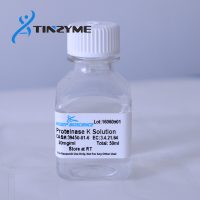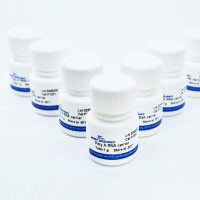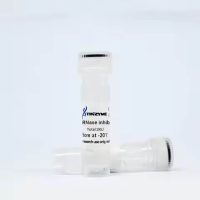
Proteinase K Lyophilized Powder 20mg
2021-12-21
HotStar Probe one step RT-qPCR mix for COVID-19
2021-12-21Description
| Product Name | Proteinase K |
| Molecular Weight | 28,900 D |
| CAS Number | 39450-01-6 |
| EC Number | 3.4.21.64 |
| Concentration | 20mg/ml |
| Source | Tritirachium album limber |
| Product Number | PK02 |
| Package size | 1ml 5ml 10ml 25ml 50ml OEM, bulk and private label are all available |
| Specific Activity | 680-800 U/ml |
| Purfity | >99.9% |
Storage Conditions
- Daily/Weekly use: Store vial at RT
- For long term storage (Infrequent use; 1-2 times per month): 2-4°C
- Expiration date three year of powder and 12 months of sterile liquid
Storage Buffer
20 mM Tris-HCl (pH 7.4), 1 mM CaCl2, 50% Glycerol (Dilution buffer without glycerol).
QC Assays
- Unit Definition: One unit is defined as the amount of enzyme that will liberate 1 μmol of tyrosine per minute at 37ºC, pH7.5.
- DNase Activity: None detectable enzyme activity with λ DNA after 6 hrs incubation at 37ºC.
- RNase Activity: None detectable ribonuclease activity after 16 hrs incubation at 25ºC.
Applications
Proteinase K is a broad substrate non-specific serine proteinase. It is very stable at pH 4-12. It was used on isolating mRNA, genomic DNA and digesting unwanted proteins during DNA and RNA preparations from different kinds of cells. It’s been used on glycoprotein modification and protein structure studies also. Proteinase K is active with SDS, urea and EDTA.
Proteinase K is used for the isolation of native high molecular genomic nucleic acids. Enzymes like DNases and RNases from microorganisms and mammalian cells are rapidly inactivated by Proteinase K.
Adding Proteinase K already during the cell lysis enables the isolation of highly native undamaged high molecular DNA or RNA. A variety of methods have been established, which are documented in numerous publications.
Recently, Proteinase K has been used for the detection of BSE forming proteins which are uniquely resistant towards the enzyme's proteolytic cleavage.
Proteinase K is very useful in the analysis of membrane structure by means of modification of proteins and glycoproteins on cell surfaces.
Because of the cleavage specificity Proteinase K, characteristic fragments of proteins are obtained which are helpful in revealing the structure and function of proteins, particularly enzymes.
Other Names
- Proteinase K
- endopeptidase K
- Tritirachium alkaline proteinase
- Tritirachium album proteinase K
- Tritirachium album serine proteinase
Order
| PK02 | Proteinase K Solution | Proteinase K solution, 20mg/ml(>680U/ml), room temperature stable |




